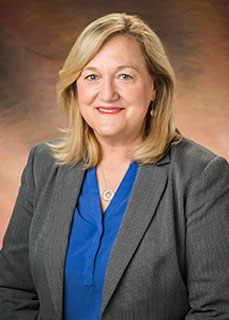HOW CAN WE HELP YOU? Call 1-800-TRY-CHOP
In This Section
CAP Treatment, CVAP Frontier Program, Community Partnerships in Research, SPR Membership

Happy Groundhog Day! Whether or not we have six more weeks of winter, scientists at Children's Hospital of Philadelphia are engaging the community outside of the hospital with four new projects funded by PolicyLab's Community Partnerships in Research grants. The Comprehensive Vascular Anomalies Program presented new research at the Arab Health Exhibition this week, and a study led by researchers in Clinical Futures, a CHOP Research Institute Center of Emphasis, identified social and emotional barriers to antibiotic treatment of viral infections. Read on to meet the six researchers who are new members the Society for Pediatric Research.
Social and Emotional Barriers Identified When Treating CAP With Antibiotics

Julia Szymczak, PhD
CHOP researchers sought to identify barriers to the implementation of a "no antibiotic " strategy for mild community-acquired pneumonia (CAP) in young children. Study results showed that although both parents and clinicians expressed broad support for the cautious use of antibiotics, pneumonia presents stewardship challenges. Interventions will need to consider the emotional, social, and logistical aspects of managing pneumonia, in addition to developing techniques to improve diagnosis.
The study team conducted interviews from January to July 2021 with parents of young children who had been diagnosed with mild CAP in the previous three years, and clinicians practicing in outpatient settings at a large pediatric hospital in the United States. Eighteen parents and 20 clinicians responded.
Clinicians sited several factors for why it is difficult to not prescribe antibiotics for outpatient children with CAP, including cultural norms regarding pneumonia, parent expectations, and a tolerance for the risk associated with excess antibiotic use.
"While our respondents were broadly supportive of using antibiotics judiciously, treating CAP in the outpatient setting presents a number of challenges for stewardship, related to emotional, social and contextual barriers, " said Julia Szymczak, PhD, affiliate faculty member and associate director of Social Science Methods in Healthcare Delivery at Clinical Futures, a CHOP Research Institute Center of Emphasis. "Interventions to de-implement antibiotics for CAP in the outpatient setting should address these challenges through things like communication training and multifaceted de-implementation interventions to modify norms. "
Pediatrics published the study findings. Learn more in this news release.
CVAP Frontier Program Shares Cutting-edge Research at Arab Health Exhibition
At the Arab Health 2024 Exhibition and Congress taking place this week in Dubai, CHOP, in association with the United Arab Emirates (UAE) Emirates Health Services (EHS) highlighted experts from the Comprehensive Vascular Anomalies Program (CVAP), exhibiting the most advanced, minimally invasive procedures and imaging technology for vascular anomalies.
"CHOP has been treating patients worldwide with vascular anomalies for more than 25 years, " said Denise Adams, MD, director of CVAP. "We are thrilled to be showcasing our multidisciplinary expertise and innovation in this field at Arab Health. Our program uses state-of-the-art genomics and personalized research strategies to identify the underlying genetic mutations that cause complex cases, which helps us to determine targeted and potentially curative therapies for patients. "
Arab Health 2024 marks the sixth year that EHS has invited CHOP to exhibit its pediatric innovation alongside EHS colleagues.
Learn more in this CHOP press release.
PolicyLab Announces Year 2 Winners for Community Partnerships in Research Awards

Tanisha Belton, DrPH, MPH, CHES
PolicyLab announced the award recipients of their Community Partnerships in Research Program, marking the second year of its support for community-engaged research. The Program's goal is to promote health equity in the Greater Philadelphia area by building and deepening community-academic partnerships for research targeting health improvements among children and their families.
"I am very excited for and proud of the Year Two awardees of PolicyLab's Community Partnerships in Research Program, " said Tanisha Belton, DrPH, MPH, CHES, senior manager of Research Initiatives for PolicyLab. "These awarded projects utilize innovative practices in community-engaged research methods with the goal of improving child and family well-being around Philadelphia. "
Joint Pilot Grant Award: These grants support established community-academic partnerships that may produce preliminary data or programs for future competitive grant applications.
- Jillian Lucas Baker, DrPH, EdM, from CHOP's Craig-Dalsimer Division of Adolescent Medicine's Center for Parent and Teen Communication, and Joel Austin from Daddy University Inc. will work on a pilot study to build communication strategies between Black fathers and their children.
- Sponsored in partnership with the CHOP Clinical and Translational Research Award program, Marné Castillo, PhD, MEd, and Bevin Gwiazdowski, MSW, and Sydney Rolle-Stern, MPH, from the Lutheran Settlement House will address interpersonal violence among LGBTQI adolescents and young adults to modify and test the evidence-based intervention, Students Talking About Relationships.
- Daniela Brissett, MD, and Nadia Dowshen, MD, MSHP, and Tawanna Jones, EdD, with we R.E.I.G.N: Rooting, Empowering, and Inspiring a Girl's Nation, will explore the impact of adultification on the medical and mental health outcomes of adolescents in an urban setting.
Partnership Development Award: This award provides seed funding to support activities related to the development of new or emerging community-academic research partnerships.
- Diana Montoya-Williams, MD, MSHP, a PolicyLab member from CHOP's Division of Neonatology, and Jenné Johns, MPH, from Once Upon a Preemie Inc. aim to form a community- and family-engaged, interdisciplinary team of ‘NICU Equity Champions' who will collaboratively build a multi-institutional research agenda focused on mitigating the impact of implicit bias and racism in CHOP and Hospital of the University of Pennsylvania NICUs.
Six CHOP Researchers Inducted to Society for Pediatric Research
The Society for Pediatric Research (SPR) announced the election of 127 new members, six of whom represent CHOP and a wide range of research. The SPR encourages and supports collaboration among its members by creating a multidisciplinary network of diverse researchers to improve child health. Meet the new members from CHOP below.
Kevin Downes, MD, focuses his research on antimicrobial clinical pharmacology and pharmacoepidemiology in children with a goal to identify novel approaches to optimize efficacy, minimize toxicity, and limit antimicrobial resistance from antibiotics.
Epidemiologist and health services researcher, Sara Handley, MD, MSCE, focuses on the perinatal healthcare system and its impact on perinatal outcomes and outcome variation.
Sarah Henrickson, MD, PhD, studies the role of T cell dysfunction in chronic allergic and inflammatory disease, including asthma and obesity.
The research interests of Jessica Rice, DO, MHS, are in the field of environmental science and premature lung disease. She studies the effects of indoor air pollution on respiratory outcomes in preterm infants.
Attending physician in the Division of Infectious Diseases, Michael Silverman, MD, PhD, investigates the fundamental aspects of early-life commensal microbes that influence immune system development to potentially treat autoimmune disease.
Laura Vella, MD, PhD, researches T follicular helper cells (Tfh) in human lymphoid tissues and circulating Tfh in lymph and blood to enhance the ability to measure and modulate human immune function in settings of immune disequilibrium, such as in chronic infection and transplantation.
Membership benefits include career development guidance, participation in child health professional research forums, and access to an awards program for outstanding achievements in pediatric research. Congratulations to all!
See the full SPR announcement for more information.
ICYMI
Catch up on our headlines from our Jan. 19 In The News:
- Renowned CHOP Pediatric Oncologist Named 2024 Fellow of the AACR Academy
- COVID-19 Vaccine Reduces Long COVID in Children
- Severe COVID-19 Illness Lower in Vaccinated Children
- Children With Special Health Care Needs More Likely to be Underinsured
- In the Neighborhood of Cellular Therapy
Keep up with our news, stories, and updates in real time by following us on X, Facebook, LinkedIn, or Instagram. Meet the minds behind the science in the Bench to Bedside podcast. Or subscribe to our newsletter to receive an email every other Friday by signing up here.



